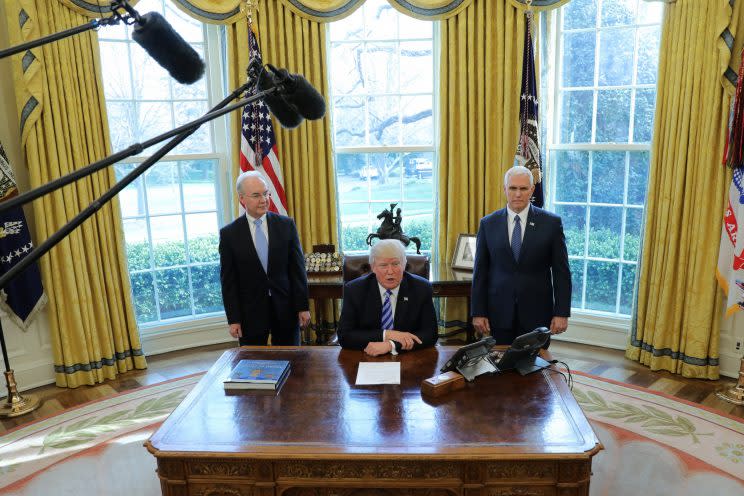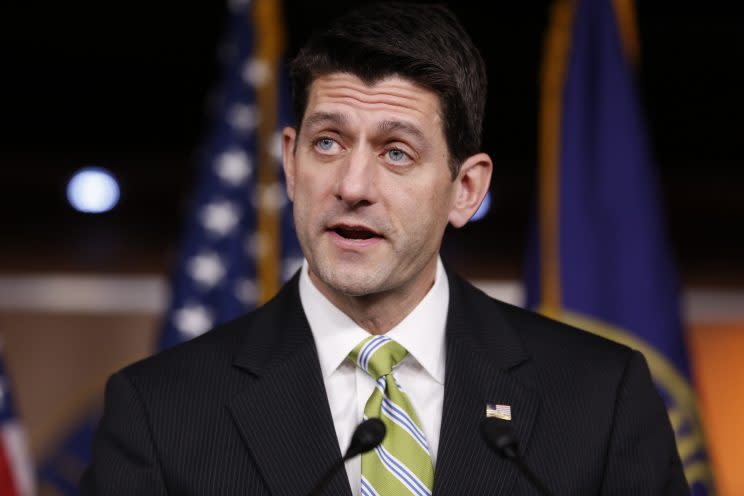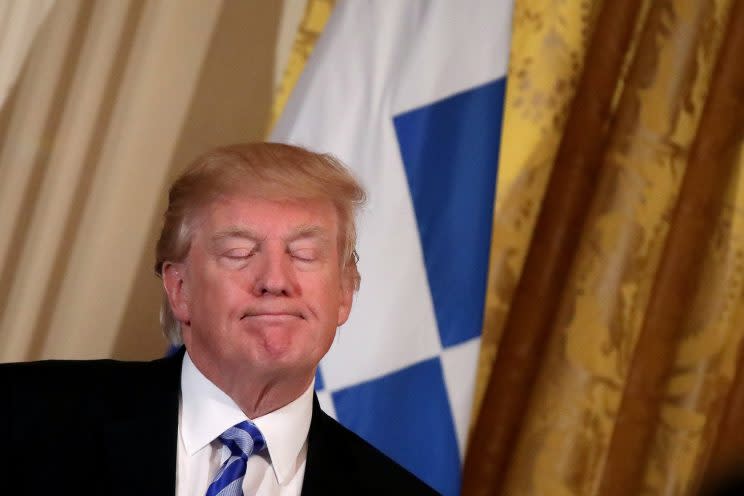Five takeaways from Trump’s health care crash and burn
President Trump’s failure to push a repeal of Obamacare through the House on Friday was a major setback in his first real test as president.
It’s a good moment to take stock of lessons learned. Here are five:
1. This is a blow to Trump’s presidency, but let’s not get carried away.
The bill’s defeat is not a mortal wound to Trump. Disregard the Chicken Littles who describe the health care failure as the end-all of everything. Trump has only been president for two months. There is plenty of time for him and for Republicans to learn their lessons, regroup and recover.
But the admission of House Speaker Paul Ryan, R-Wis., that the United States will be “living with Obamacare for the foreseeable future” means that it’s unlikely Republicans will repeal the Affordable Care Act any time soon, if at all, during the next two years. They had a limited window of time to do this now, for complex procedural reasons, and because of Trump’s insistence that they do it quickly.
Now, Trump wants to move on to tax reform, which means that they can’t do health care reform this year. And it’s unlikely they’d want to touch such a controversial topic next year, when every member of the House is up for reelection.
As for Trump and Ryan’s relationship, which was rocky at best during the presidential election, Trump gave Ryan a vote of confidence. “I like Speaker Ryan. He worked very, very hard,” he said. A House Republican leadership aide added: “The president and speaker have a solid relationship. He knows Ryan worked his butt off to get these votes.”

2. Trump didn’t lead from the beginning, because he didn’t have a clue what he was doing, and it cost him.
“Nobody knew health care could be so complicated,” Trump famously said five weeks after his inauguration. The new president did not grasp the process of passing a health care bill, the politics or the policy.
Trump is notorious for scorning details. And so he provided no leadership on what the bill should look like at the front end of the process, leaving the entire venture to Ryan, who will also come in for plenty of criticism for drafting a bill that was widely criticized for its incoherence — even by some of the speaker’s close allies.
Vox’s Ezra Klein documented all the ways that Trump repeatedly made statements about what the health bill would do — promises that were completely at odds with what was actually in the legislation. And yet Trump continued to push ahead for a law that contradicted his very goals for health care reform.
Trump’s insistence on rushing ahead also complicated the process. Ryan and others in congressional leadership had preferred to focus on a process that dealt first with repeal, and then with replacement. Trump wasn’t the only impatient one. Many members of Congress wanted to do both at the same time, fearful of political blowback if they passed a bill that would kick millions off Medicaid — even if that would be delayed — without an answer for what would they would do instead.
But there’s no question that Trump pushed Congress to both repeal the ACA and replace it on a timeline that was wildly out of touch with reality. On Jan. 10, Trump told the New York Times that he expected Congress to pass a repeal bill “probably some time next week” and to replace it “very quickly or simultaneously, very shortly thereafter.”
Trump vastly underestimated the challenge involved in passing any major bill, much less one devoted to health care. Because of that, he created expectations that forced Republicans in Congress — who painstakingly built consensus last year around a replacement bill through Ryan’s “Better Way” plan — to try to rush a bill through Congress that quickly attracted opposition.
3. Ryan’s failure to win over conservatives was both inexplicable and unsurprising.
Ryan spent all of 2016 creating consensus about how to replace the ACA, in a widely praised process. Then he rushed the actual legislation through the House, without trying to win over conservative groups and lawmakers beforehand.
In one sense, Ryan had to hurry because Trump was announcing to the American people that repealing Obamacare would be done quickly, and because the process necessary for passing its replacement, known as budget reconciliation, also meant Republicans had to be done with health care before they moved on to tax reform.
But the resistance of the conservative House Freedom Caucus and outside groups like Heritage Action hurt the rollout of the bill from the beginning, and it never recovered. Ryan and GOP leadership probably should have done more to try to win them over ahead of time, but on the other hand, there was never an expectation that they would be able to win them over no matter what they did.
“Given that Heritage Action was going to say, ‘Hell no,’ and the establishment press was going to run to them and cover them, you couldn’t get around that,” Grover Norquist, president of Americans for Tax Reform, told Yahoo News two weeks ago.
Ryan noted Friday that it is going to be a process for Republican hardliners to learn how to compromise. This is a group of people who have done little but oppose things for the last decade and been rewarded for it with fundraising dollars, notoriety and reelection.

4. Tax reform is not going to be any easier.
Trump, after the failure of the health measure, moved immediately to talking about tax reform. That, however, is an even more challenging topic for Congress to address, largely because there are so many interests arrayed against it.
The GOP tax reform bill in its current form raises revenue to offset the cost of tax cuts through a tax on imports. That proposal is opposed by big retailers like Walmart, and by the powerful Koch Brothers’ political organization. A large number of senators have signaled that they are opposed to the border trade adjustment tax.
But if the revenue stream were changed to closing tax loopholes for corporations and individuals, then opponents of the bill would really come out of the woodwork.
“Health care is like a 30-yard chip shot, compared to tax reform,” said Josh Holmes, a former chief of staff to Senate Majority Leader Mitch McConnell, R-Ky.

5. Trump, so far, is looking a lot like Jimmy Carter
Several journalists have noted a number of similarities between Trump and Carter, many of which have been on display during the battle over health care. But the comparison goes only so far.
Carter and Trump both ran as Washington outsiders, and against the political establishment. Carter in 1976 said the government was “disorganized, wasteful, has no purpose and its policies — when they exist — are incomprehensible or devised by special interest groups with little regard for the welfare of the average American citizen.”
And both men also entered the presidency with little use for Congress. “I alone can fix it,” Trump boasted during his acceptance speech at the Republican National Convention. Carter also assured then-Speaker Tip O’Neill that he would treat Congress as he had treated the Georgia Legislature, and that if they did not go along with his agenda, he would “go over the heads of the representatives by appealing directly to the voters.”
It’s still quite possible that Trump does this very same thing, using his celebrity and his social media bully pulpit to hammer members of Congress for voting against the health bill. He might also campaign in their districts and promote primary challengers.
But if this health fight has taught Trump anything, it is that the challenges of governance are tougher than he had expected, because Congress is a complicated and formidable institution.
Trump did do something in the last week or so that Carter avoided, seeking to win over lawmakers face to face, with both charm and threats. Carter preferred to explain and reason, and scorned the more personal approach to dealing with lawmakers.
Read more from Yahoo News:



